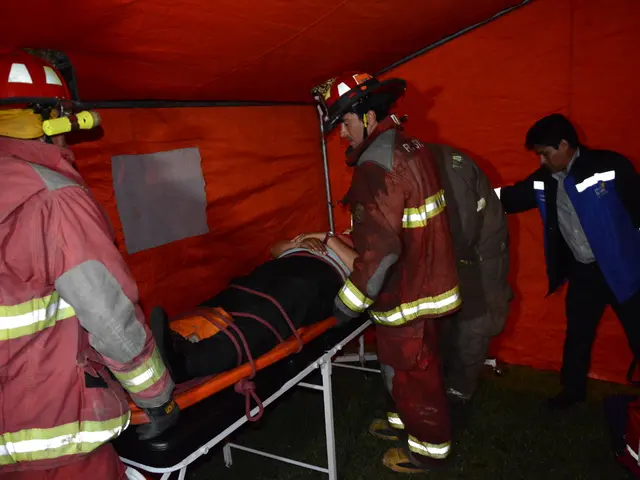Knee Arthritis Remedies: Exploring Medications and Additional Strategies
Arthritis in the knees isn't always the common, age-related wear-and-tear form known as osteoarthritis (OA). There are several less common types of knee arthritis that can affect individuals, including bursitis, gout, pseudogout, septic arthritis, and psoriatic arthritis.
Bursitis is a condition characterised by inflammation of the bursae, small fluid-filled sacs that cushion the knee joint. This inflammation can cause localised pain, swelling, stiffness, and tenderness, often resulting from repetitive movements or direct trauma to the knee bursae.
Gout is another less common form of arthritis that occurs due to the accumulation of uric acid crystals within the knee joint. This accumulation leads to sudden, intense pain, redness, and swelling. Though it commonly affects the big toe, gout can also affect the knees and cause severe inflammatory arthritis episodes.
Pseudogout, similar to gout, involves calcium pyrophosphate crystal deposition in the knee joint, causing acute inflammation and pain.
Septic arthritis is a serious form of arthritis caused by an infection inside the knee joint. This condition presents with joint pain, swelling, redness, and systemic symptoms and requires urgent treatment.
Psoriatic arthritis is an autoimmune form of arthritis associated with psoriasis and can involve the knees. It may cause joint inflammation, pain, and swelling, often asymmetrically.
OA, rheumatoid arthritis (RA), and these less common forms are all types of arthritis. People over 50 years old are more likely to develop OA, while RA typically affects both knees at once. Doctors will prescribe the best treatment for a person based on the type of arthritis they have and their personal circumstances.
For OA, doctors may prescribe medications to reduce inflammation and pain, such as Non-Steroidal Anti-Inflammatory Drugs (NSAIDs). In some cases, other pain relief medications like acetaminophen or topical creams/sprays may be recommended. If one type of treatment does not help a person with arthritis or causes serious side effects, doctors may prescribe a different treatment.
For RA, treatment options include NSAIDs, corticosteroids, or Disease-Modifying Anti-Rheumatic Drugs (DMARDs). In some cases, biological treatments such as infliximab, adalimumab, and etanercept may be recommended in combination with DMARDs for treating RA, if DMARDs are not effective on their own.
Physical therapy, exercise, safe weight loss, avoiding activities that increase knee pain, and using assistive devices such as walking canes, knee braces, and knee sleeves may help decrease pain and increase function in a person with knee arthritis. In severe cases, surgery such as arthroplasty, cartilage restoration, osteotomy, or synovectomy may be necessary.
If you experience pain, stiffness, or swelling in or around one or both of your knee joints, it's essential to consult a healthcare professional. Early diagnosis and treatment can help manage the symptoms and prevent further damage.
- Beyond osteoarthritis, other types of knee arthritis like bursitis, gout, pseudogout, septic arthritis, and psoriatic arthritis can occur, each with distinct symptoms and causes.
- Medical-conditions such as pseudogout, similar to gout, are characterized by the deposition of calcium pyrophosphate crystals within the knee joint, causing severe inflammation and pain.
- In the context of health-and-wellness, it's vital to recognize the differences among various chronic diseases like arthritis, especially less common forms, and seek appropriate treatment to manage symptoms.
- When it comes to managing arthritis, the approach varies significantly depending on the type of arthritis (OA, RA, or less common forms) and the individual's specific circumstances.
- In the case of rheumatoid arthritis, doctors may prescribe a combination of NSAIDs, corticosteroids, DMARDs, and biological treatments like infliximab, adalimumab, or etanercept to control symptoms.
- For individuals experiencing symptoms such as joint pain, swelling, or stiffness in their knees, it's crucial to consult a healthcare professional for a thorough evaluation and potential retargeting of treatment strategies if initial treatments aren't effective.




